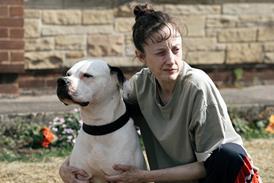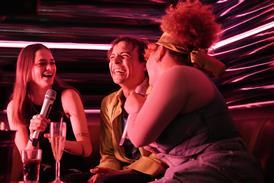Billed as "a surprise package of recent German cinema", the first films in the Perspektive Deutsches Kino programme include the directorial debut of Franka Potente, the German actress who became an international star on the back of Run Lola Run and The Bourne Identity and its sequel.
Celebrating its fifth year, the Berlinale sidebar devoted to German cinema features nine world premieres.
Potente's first stint as director is certainly unexpected. Her film, Der die Tollkirsche ausgräbt (Digging For Belladonna) is both black-and-white and silent. The actress wrote and directed this homage and light-hearted reflection on her favourite medium. It features a silent Emilia Sparagna, as well as Christoph Bach, Max Urlacher, Justus von Dohnanyi and Teresa Harder.
Another actor who is stepping behind the camera for the first time is Zsolt Bács (Baader). His directorial debut, Esperanzais a story about a group of unusual characters on a run-down luxury cruiser on anew year's voyage who grapple with love, life and death. The film stars Anna Thalbach,Mavie Hörbiger, Frank Giering, Boris Aljinovic and Gojko Mitic among others.
Set in
Markus Herling's magical drama, Schöner Leben (Riding UpFront) is alsoset in
Nikias Chryssos,a student at the
In Nichtsweiter als(Nothing More Than), is a 25-minute cinematic experiment by Lars Büchel a director of both cinema and advertising films. Büchel presented four filmmakers - FriederikeJehn, Sebastian Stern, Jens Schillmöllerand Lale Nalpantoglu with anArne Rautenberg poem asking each of them to adapt itto the screen.
Dietrich Brüggemann's Neun Szenen (NineTakes) co-written with his sister, actress Anna Brüggemannis a film shot in nine sequences. Dietrich gets his contemporaries to discussand live out what moves them or acts as a distraction in their everydaylives.
In Christian Moris Müller's drama, Vier Fenster (Four Windows) a family is represented as amicrocosm of society where everyone is trying to get one over each other. Thisco-production between the Babelsberg and
In the documentary Warum halb vier'(Why Three-Thirty - You'll Never WalkAlone) directorand producer, brothers Lars and Axel Pape examine thesocial and philosophical aspects of the beautiful game - football and all theemotions it can trigger such as violence and friendship.
Perspektive
Auszeit (Time Out) by Jules Herrmann
Der die Tollkirsche ausgräbt (Digging forBelladonna) by Franka Potente
Esperanza by Zsolt Bács
Hochhaus (Towerblock)by Nikias Chryssos
Katharina Bullin - Und ich dachte ichwär' die Größte (Katharina Bullin - And I ThoughtI Was the Greatest) by Marcus Welsch
Der Lebensversicherer(Running On Empty) by Bülent Akinci
Nichts weiter als (Nothing More Than) by Friederike Jehn, Sebastian Stern,Jens Schillmöller, Lale Nalpantoglu and Lars Büchel
Schöner leben (Riding UpFront) by Markus Herling
Vier Fenster (FourWindows) by Christian Moris Müller
Warum halb Vier' (Why Three-Thirty - You'll Never WalkAlone) by Lars Pape
Wholetrain by Florian Gaag
The Perspektive Deutsches KinoSpecial for the Berlinale "Kinotag"(February 19):
Neun Szenen (NineTakes) by Dietrich Brüggemann

















No comments yet